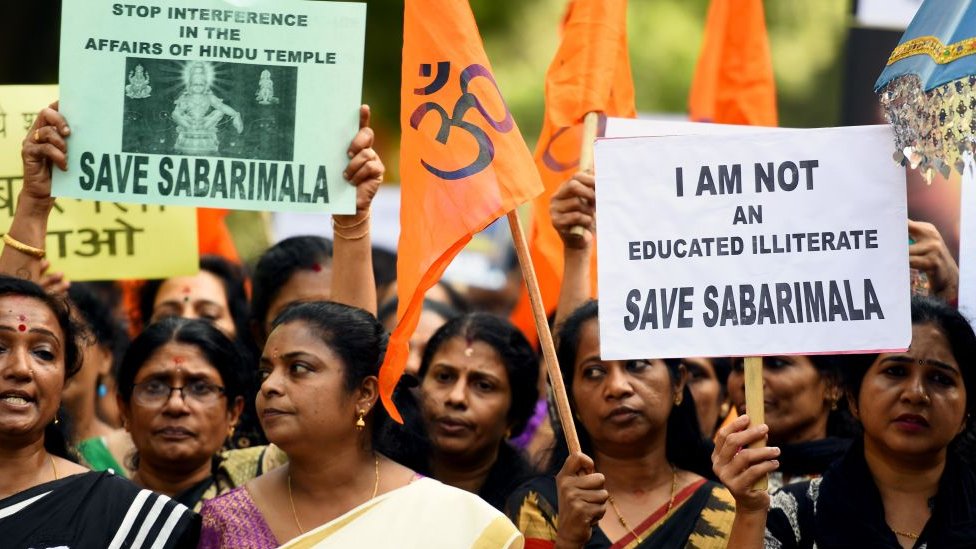INSUBCONTINENT EXCLUSIVE:
Image copyrightGetty ImagesImage caption
Protesting women feel that no one cares to understand their worldview
A recent Supreme Court ruling, which has been hailed as a feminist victory, has instead angered the Indian women it was meant to
empower, says commentator Shyam Krishnakumar
At the Sabarimala temple in the southern Indian state of Kerala, a tense stand-off is under way between women who are determined to use a
judicial verdict to enter the temple and large groups of devotees including women, making a last-ditch effort to preserve the integrity of
their age-old traditions.The issue began with a recent Supreme Court verdict allowing the entry of women between the ages of 10 and 50,
which was prohibited by the temple's traditions
Why has a seemingly feminist verdict caused a groundswell of protest including from the very subaltern women it was meant to
empowerSabarimala commands a massive following cutting across caste, gender and linguistic lines
Every year, millions of pilgrims including tribal communities, Muslims and Christians, undertake a rigorous 41-day fast and embark on a
barefoot pilgrimage to the temple which located in the dense forests of the Western Ghats
Image copyrightGetty ImagesImage caption
Sabarimala is dedicated to the deity Ayyappa in the form of an eternal celibate
in penance
The temple is dedicated to the deity Ayappa in the form of an eternal celibate in penance
Therefore, traditionally only men, very young girls or post-menopausal women enter the temple
Two weeks ago, a five judge bench of India's Supreme Court struck down the restriction on women of "menstruating ages"
The four male judges delivered a majority verdict on the grounds of gender discrimination and because it wasn't an "essential practice" of
Indu Malhotra, the only woman judge on the bench, disagreed with the majority verdict."Issues of deep religious sentiments should not be
ordinarily interfered by the court Notions of rationality cannot be invoked in matters of religion," she said in her dissenting
opinion.Observing that women's right to worship Lord Ayappa was not violated as there are a thousand other Ayappa temples without
Justice Malhotra added the court must not interfere unless approached by an aggrieved person from the denomination.Objections
notwithstanding, the verdict was widely celebrated as a progressive step by an activist judiciary in ensuring women's "right of
worship".Image copyrightGetty ImagesImage caption
Many of the protesters against women entering the temple are women
themselves
Then, something unexpected happened
In town after town in Kerala, tens of thousands of women hit the streets protesting against the verdict
This spread across India with marches in Delhi, Bangalore, Chennai and internationally in the UK, US and Canada
Sensing the pulse, India's leading Hindu nationalist organisation, the Rashtriya Swayamsevak Sangh (RSS), and the ruling Bharatiya Janta
Party (BJP), who were initially in favour of the judgement, did a flip-flop and were eager to be seen supporting the protests
The main opposition Congress party also joined the bandwagon
Consequently, multiple party-led protest marches and some incendiary statements followed.Imposing a liberationKerala is not a place where
It has historically been a matrilineal society where women have controlled and inherited property for centuries
The state has the highest literacy rate in India and its social indicators are comparable to developed countries
The protesting women feel that no one cared to understand their worldview
They feel that those with privilege and a voice are imposing a "liberation" that these women do not seek
"The authorities misread the situation by looking at this issue through a colonial prism," says Anjali George, who pioneered a social media
campaign in favour of the temple's ban on women."This has effectively contributed to a situation where people are losing faith in the
ability of the system to protect their religious rights and traditions."Image copyrightGetty ImagesImage caption
Hinduism comprises a diverse set of cultural practices and traditions
Hinduism is an umbrella term for a staggeringly
diverse set of cultural practices, traditions and systems of worship
While the celibate Lord Ayappa at Sabarimala does not see women devotees of a certain age, the same deity is worshipped in a married form in
other temples by both women and men
And it's not only women who are barred from some temples.The Kamakhya Temple in the northeastern state of Assam bars men from entering
during the auspicious time when the goddess menstruates
Creating artificial homogeneityHardly a dozen among the few millions of temples in India have gender-based entry restrictions
Equality cannot become a premise to create an artificial homogeneity, forcing a conformity that destroys diverse, intergenerational
practices which enjoy the support of all stakeholders including women
No efforts are taken to sincerely engage with the practices of the actual stakeholders
What masquerades under the garb of "reform" is a way to impose modernity on native practices by judicial writ and state force if necessary
The judgement has also raised disturbing questions about the relationship between religion and state in India
The government has become increasingly involved in managing religious institutions and the judiciary in determining correct religious
Noted advocates Fali Nariman and Rajeev Dhavan offer a scathing indictment of this saying "judges have virtually assumed the theological
authority to determine which tenets of a faith are 'essential'".The stand-off at Sabarimala exposes the stark dichotomy between a
cosmopolitan elite who celebrate the "liberation" of women and the visceral grassroots reaction from millions of women devotees who feel
their voices are not being heard in today's India.

